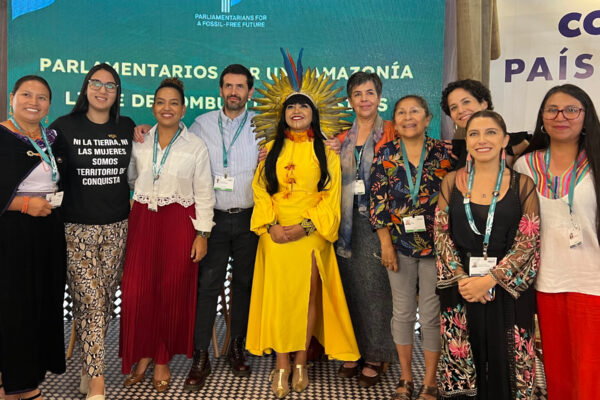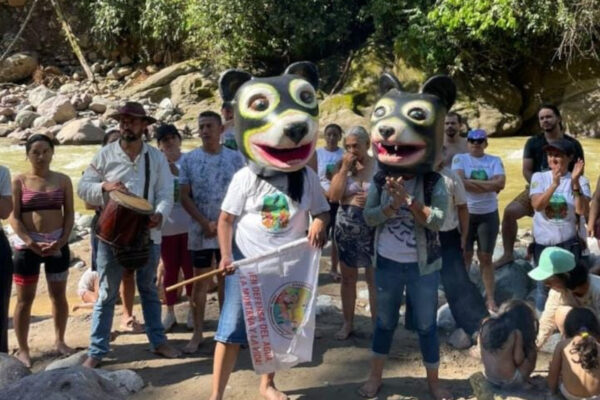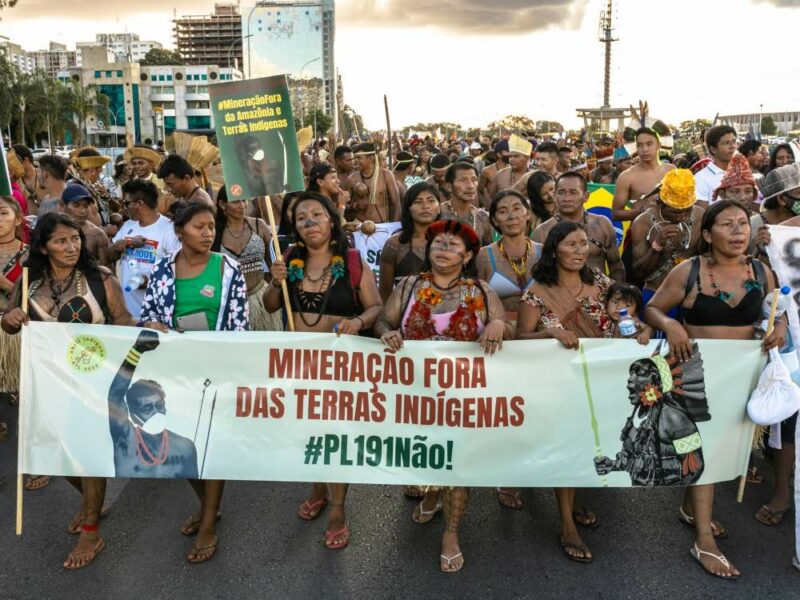“The answer is us!” cried more than 300 Mura leaders, youth, and elders during the VIII Assembly of the Mura People, held last month in the Lago do Soares Indigenous Land, a traditional Mura territory about 112 km from Manaus.
Amazon Watch attended in solidarity. In a powerful show of unity and resistance, the Mura reaffirmed their opposition to Brazil Potash’s massive mining project and demanded the titling of their ancestral territory.
This year’s assembly carried particular historical significance: representatives of the Munduruku people joined in solidarity, marking a profound moment of shared struggle. The two peoples stood together to defend their rights, cultures, and territories from the expanding threat of industrial mining.
Backed by national and regional Indigenous organizations, the Mura condemned the company for manipulating consultation processes, erasing their identity, and violating their constitutional rights. With COP30 on the horizon, the Mura are bringing their fight to the international stage.
The Mura Indigenous people have traditionally inhabited the Madeira, Purus, and Amazonas rivers in eastern Amazonas state. For more than a decade, they have fought to defend their lands from Brazil Potash, a transnational mining company controlled by Forbes & Manhattan that seeks to build a massive sylvinite mining complex within their traditional territory. The company’s Autazes Potash Project, now in the environmental licensing stage, has fueled conflict and division within Mura communities and led to the violent silencing of Indigenous voices opposing the mine.
But the Mura refuse to be silenced. The assembly, held in late May, marked a turning point in the mobilization against Brazil Potash. It brought together grassroots associations and regional and national Indigenous organizations, including the National Association of Indigenous Peoples of Brazil (APIB) and the Coordination of Indigenous Organizations of the Brazilian Amazon (COIAB).
According to Gersem Baniwa – an Indigenous activist, educator, and intellectual – the assembly marked a pivotal moment for the Mura and the wider Indigenous movement: “What happened at this large meeting was not just a gathering of the Mura most directly affected by the Brazil Potash project. Rather, the significance of this event lies in the fact that this struggle has become, first and foremost, the struggle of all Indigenous peoples.”
The Mura demand recognition and respect for their rights and identity. “We are a traditional Indigenous people who have lived on this land for hundreds of years. Our elders tell us this story. Non-Indigenous historians and scientists confirm this history. Yet our very existence is being erased because a company wants to exploit our territory. We will fight in every way we can,” says Gabriel Mura, Tuxaua (leader) of the Lago do Soares Indigenous village.
After three days of presentations, shared meals, rituals, dances, and intense debates, the assembly concluded with a resolution affirming the core principles of Mura mobilization:
“We reaffirm that we do not accept mining in our territories under any circumstances; that the demarcation of our lands is a constitutional right and is non-negotiable; that we will resist any attempt to invade or destroy our way of life; that we will not back down in the face of attacks by agribusiness, mining companies, or negligent or complicit governments. We are a living people, organized and determined to defend our rights (…).”
Erased and ignored: How Brazil Potash targets the Mura
The Brazilian Federal Constitution prohibits mining in traditionally occupied Indigenous lands. Nevertheless, the sylvinite deposits targeted by Brazil Potash lie within the Lago do Soares Indigenous Land, a traditional territory that, according to historical records, the Mura have occupied since at least the mid-19th century.
The Mura’s legal right to their traditional territory poses an insurmountable obstacle to Brazil Potash’s mining project. In response, the company has chosen to deny the existence of the Mura community. In its environmental impact studies, Brazil Potash describes the Mura’s presence as “rural collectives” or an “urban center,” erasing their ethnic identity and undermining their rights to land and to Free, Prior, and Informed Consultation.
Despite ongoing demands for official demarcation, government neglect has left Lago do Soares without formal recognition or legal title, making it more vulnerable to extractive exploitation. According to João Lisboa, a lawyer and legal advisor to the Mura resistance, “This mechanism of ethnic invisibility constitutes a practice of institutional violence. Denying full Indigenous status is used to weaken constitutional protections and exclude the Mura from decision-making processes.”
Brazil Potash has combined ethnic erasure with the selective co-optation of Mura leaders to weaken traditional decision-making structures and undermine Indigenous self-determination. In 2023, the company co-opted the Mura Indigenous Council (CIM) and held a consultation process that excluded the Lago do Soares Mura community. The company ignored and misrepresented the official Consultation Protocol developed and approved by all Mura communities. The resulting process relied on co-optation, misinformation, economic promises, and restricted access to information – creating a deliberate simulation of consent.
In 2018, the Mura carried out an autonomous self-demarcation of Lago do Soares. Five years later, the National Foundation of Indigenous Peoples (FUNAI) established a working group to formally identify the traditional territory – the first step in the official land demarcation process. This working group represents the beginning of a process essential to protecting the Mura’s land rights. However, the process must move quickly to prevent further irreversible harm to the Mura’s social, political, and cultural fabric.
Building a united front: Mura mobilize for international action
Over the past 15 years, Mura resistance organizations have submitted multiple complaints against Brazil Potash across various legal and administrative venues.
The VIII Assembly of the Mura Peoples marked two major turning points in their resistance movement. The first was their decision to bring the fight against Brazil Potash to the international stage, starting with COP30. In the approved resolution, the Mura denounced institutional silence in response to violations of rights guaranteed by the Brazilian Constitution and international treaties. They declared, “COP30 will be a strategic moment for international mobilization.”
The decision to bring these complaints to the international stage follows repeated failed attempts to engage with the Amazonas state government, environmental licensing agencies, and Brazil’s judiciary, which continues to validate violations of constitutional rights and ILO Convention 169. The Autazes Potash case has driven a deliberate erosion of the legal framework protecting Indigenous rights in Brazil and seeks to normalize illegal practices for economic gain. When the justice system fails to uphold even basic rights – such as Free, Prior, and Informed Consultation – communities are forced to seek justice through international mechanisms.
The second key development was the formation of a broad, multi-level coalition of Indigenous and non-Indigenous organizations standing in solidarity with the Mura of Lago do Soares and opposing all mining in Indigenous territories.
At the VIII Assembly of the Mura People, grassroots Mura organizations were joined by allies and partners, including APIB, COIAB, the Coordination of Indigenous Peoples of Amazonas (APIAM), and the Coordination of Indigenous Peoples of Manaus (COPIME). Representatives of the Munduruku Ipereg Ayu resistance movement also attended, sharing their experiences resisting megaprojects along the Tapajós and Xingu rivers.
United in their opposition to extractivism, these organizations emphasized that protecting Indigenous territories from transnational mining demands coordinated resistance at local, national, and global levels. Despite facing rights violations, institutional neglect, and political violence, the Mura resistance has succeeded in building these networks.
As Indigenous educator and intellectual Gersem Baniwa said, “We left the assembly confident that the strength of the Indigenous peoples’ struggle against mining on Indigenous lands will be demonstrated. We also reaffirmed our ties with organizations and other long-standing partners. We are forming a broad front. Everything indicates that the next meetings of the Mura people will be increasingly powerful and decisive in confronting mining on Indigenous lands, especially in confronting Brazil Potash. Our struggle is just beginning.”














